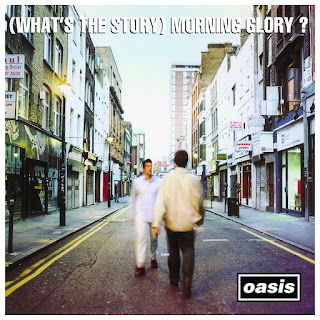Upon first listen, there isn't a whole lot of difference between the music on Morning Glory and the preceding Definitely Maybe, but once you get into the record, the aspects that distinguish the two become more apparent, with the biggest change being in the arrangements of the songs. On Morning Glory, Noel Gallagher's songs take on a much bigger scale, with grand orchestration on the choruses and an overall "bigger" sound throughout the record, a logical continuation from the more grimey and rock-oriented debut. Even with the new arrangements that show their face on plenty of songs (the sharpest example being the acoustic-leaning and melancholic "Cast No Shadow", as an aside), it still fits well within the Oasis mold with its blaring guitars, pounding rhythm section, and production style, yet again headed by Owen Morris (albeit now with Noel Gallagher behind the console as well). These changes also carry over to the lyrical themes of the album, painted much more in a triumphant energy and bright choruses and positive assertions; you gotta roll with it; feel no shame; she's electric; it expands on the uplifting energy on the first album from songs like "Live Forever" or "Slide Away" in a satisfying manner, even with its moments of sadness such as the bittersweet "Some Might Say" or the aforementioned "Cast No Shadow". Outside of emotional themes carrying forward, the album feels very much like a continuation of Definitely Maybe in its concept as well: Noel Gallagher remarked in a review that Definitely Maybe was largely about wanting to make it in a rock group, and Morning Glory feels like picking right up where they left off - on this album, Oasis are starting to really make it big, and that feel comes across all throughout the album.
So the groundwork for the album is a great success, now what for the songs? Well, when two of your singles get to Number 2, and two others go all the way, that's probably a good sign. From front to back, Morning Glory is a fantastical charcuterie board of choruses, hooks, and the same pseudo-poetry in the lyrics that helped make the first album so fantastic, but now with even greater heights. One only needs to look at the singles to see this quality; "Roll With It" is a Slade-leaning rock number with a solid hook and a great driving rhythm; "Some Might Say" had every right to be their first Number One hit with its shining chorus and melancholic underbelly, while also containing some of Noel's most cryptic and poetic lyrics; "Wonderwall" with its immediate acoustic chords and iconic opening lines has been permanently tattooed into the skin of culture, and remains their biggest hit to this day (at least here in the U.S. of A); "Don't Look Back in Anger" is the group's highest watermark, their crowning achievement in the singles market with its soaring chorus and brilliant composition. Outside of the immediate hits, there's still plenty of ear-catchers on this record, from the surprisingly bittersweet "Hello" that opens the album to the fantastic rock of "Hey Now!" (with some excellent Beatlesque strings on the chorus, by the way), the beautiful "Cast No Shadow", and the lighthearted and tongue-in-cheek "She's Electric", the most Beatlesque song of their career to this point - it even grabs its ending harmonies from "With a Little Help From My Friends", but when the song is this catchy, I can hardly complain. Then, of course, there's the album's one-two finishing punch on the fantastic straight rock of "Morning Glory" and the climactic closing of "Champagne Supernova", a brilliantly spacious rock anthem complete with a fantastic guitar solo from Paul Weller (of The Jam fame). The ending result is a gigantic closing finale, and one of Oasis' all-time achievements.
Would you believe me if I said that Morning Glory got mixed reviews at the time? Well, time's been kind to this one, and especially when that time is within a few months before music magazines realized they'd sell more copies by praising the Gallaghers, Bonehead, Guigs, and new drummer Alan White - by the next year, it was clear that Oasis were becoming the biggest group in the world, and when one revisits Morning Glory is isn't hard to see why that is. It's a shining example of pop and rock in the 1990s, bursting with life, positivity, and great melodies from start to finish. It's not as straightforward and rocking as its predecessor (although some of the album's B-sides get there, but that's a review for another day), but when the tunes are this consistently good and the songs still as filled with life as they are, it doesn't exactly matter. It remains Oasis' greatest triumph - their most consistent, best produced, and catchiest album of their entire career, and a certified classic of 90s rock. It's electric, and a listen will easily make you electric too.
RATING: ✯✯✯✯✯✯✯✯✯✯
Listen to (What's the Story) Morning Glory?

Excellent review!
ReplyDelete